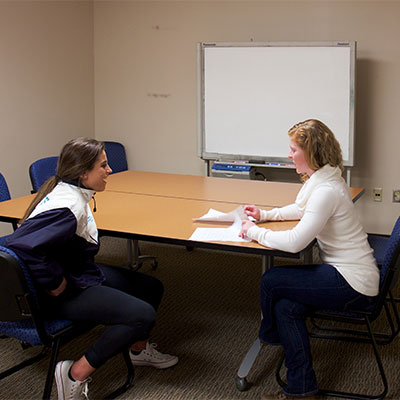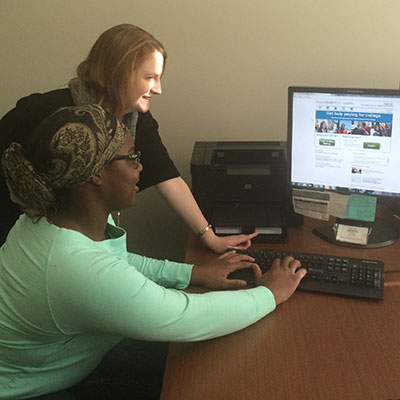There’s nowhere that the details matter more than Academics, the heart of student success at West Chester University. As our strategic plan declares, the “University is dedicated to excellent academic programs while supporting an academic environment that ensures student success.”
Look closer; here are some of the ways we support our students’ success.

Daniel J. Gallagher is a junior psychology major. He was a member of the U.S. Air Force for six years, serving most of his enlistment in Alaska with deployments and training missions to the United Arab Emirates, Japan, Hawaii and Texas. Today, his academic interests include post-traumatic stress disorder among veterans. He has conducted research at the Coatesville Veterans Affairs Medical Center and shared this work in a class sociology presentation and a psychology research paper. When he graduates from WCU, Gallagher wants to take what he has learned and help veterans who are grappling with PTSD.
While only a small percentage of veterans experience long-term PTSD, almost every veteran will experience a challenge or two as they transition from military to civilian and student life. That’s where Lillian Morrison comes in. Coordinator of WCU’s Veterans Center, Morrison works with Financial Aid and other units on campus to help military members access their educational benefits. As a veteran herself, she serves as a sounding board and trouble-shooter for WCU military members and their families.
Gallagher and his fellow vets, as well as ROTC cadets, often can be found at the Veterans Center in-between classes. A welcoming retreat on South High Street, the center offers a computer room for studying and a lounge for relaxing. There’s always free coffee, printing and scanning. There are even showers, which come in handy for ROTC cadets who have a class right after morning PT.
In March, the center was re-named the Greg R. and Sandra L. Weisenstein Veterans Center in honor of the retiring WCU president and his wife. The Weisensteins have worked to make West Chester University’s military support and programming unrivaled.

Maia Curry is a first-year WCU student who was a Pennsylvania state champion in gymnastics during her senior year in high school. Today, she continues to shine on the mat as a member of WCU’s gymnastics squad. She competes in vault, uneven bars and balance beams. At a mid-February meet at Yale, she achieved an outstanding score on the vault and finished third overall. Earlier that same week, she took an exam, wrote a research paper, and met with other students about a collaborative class project.
How does the 18-year-old juggle a demanding course load with daily practices and frequent travel to meets?
One secret to her success is WCU’s Athletic Mentoring Program. Curry heard about the program from her coach, and signed up as soon she arrived on campus this past fall.
She was matched with Erin Saunders, an Academic Mentor and a graduate student in the Higher Education Counseling/Student Affairs program. Saunders was a diver in college so she knows first-hand the stresses that student athletes face.
Good nutrition, adequate sleep, study skills and time management skills are paramount to staying on an even keel. Saunders says her relationship with Curry is all about “pat and push.”
“Maia, like most student athletes, has great drive and self-discipline,” says Saunders. “Sometimes the most important thing I can do is to pat her on the back, encourage her, and make sure she isn’t being too hard on herself. Other times, though, Maia needs a little push to make sure she doesn’t forget a homework assignment even if she got off the team bus at midnight the night before.”
“The most important role that Erin plays is making sure I'm staying on top of my homework and keeping me updated on my grades,” says Curry. “I meet with her once a week but we are usually in contact throughout the week. This program has definitely helped me with my school work.”
The Athletic Mentoring Program features multiple tiers of assistance and intervention, based on the needs of each student. It is overseen by Tammy James, a professor of health and coordinator of academic support services for Athletics. She works in close collaboration with Gerardina Martin, director of the Learning Assistance and Resource Center (LARC), and Jacqueline Hodes, an assistant professor of counselor education.
Students enrolled in the Athletic Mentoring Program also participate in an open study session for at least four hours weekly. The study hall runs from 7 p.m.- 9 p.m. every Sunday to Thursday during the fall and spring semesters. Some coaches require their players to attend three or more nights of study hall each week.
David Diaz is the study hall program coordinator. Like Saunders, he is a graduate student in the Higher Education Counseling/Student Affairs program and a former college athlete – in his case, club cycling at Temple.
Eighty-five students attend the study hall on a regular basis, most days a week. About 45 more students drop in periodically throughout the semester. Diaz has a warm, engaging manner and builds close bonds with the student athletes, both in and outside the study hall. At a football game this fall, he relished the chance to meet a player’s mom and little sister and take a family photo for them.
“I like that the program is student driven—we work to find out what the students’ needs are and then fulfill those needs,” notes Diaz. “Our student athletes are feeling supported and getting the resources necessary to persist toward their goal of a college degree.”

Nafeesah Muhammad is a sophomore biology major who plans to become a physician’s assistant. She is one of 26 West Chester University students who are classified by the federal government as unaccompanied homeless youth. When they are not living on campus, these students reside in shelters and other temporary housing.
Tori Weigant, WCU’s assistant director of financial aid, has become a frequent and welcome presence in Muhammad’s life. Weigant helps Muhammad file her taxes and financial aid forms, apply for food stamps and health insurance, and make plans for holiday breaks when the residence halls close. Having lived independently since she was a high school junior, 21-year-old Muhammad appreciates the support, advice and friendship that Weigant provides.
Although many would find Muhammad’s fulltime course load coupled with two part-time jobs daunting, she sails through her days. “It’s a lot easier, ” says the Philadelphia native. “ I was getting up at 5 a.m., at the shelter, to catch the bus to high school and then taking another bus to work afterwards,” she says. “I’ve got a good routine here at WCU. It’s going well.”
And whenever things don’t go well – or Muhammad simply needs a friendly ear – she knows exactly where to go. Tori Weigant may be her financial aid officer but she also has become the big sister Nafeesah Muhammad never had.
For many years, WCU has worked informally to assist homeless students as they navigate the college experience on their own, says Dana Parker, director of financial aid. “For example, we’ve helped these students complete financial aid forms and made exceptions for them so that they could receive aid without parental information,” he says. “In the past two years, under Tori’s leadership, WCU’s process has become more formal, prompting referrals from other campus offices.”
WCU’s programming has been recognized by the National Association for the Education of Homeless Children and Youth. Weigant is currently working with this association to help build a network of programming for homeless university students statewide.
Another innovative program – this one still under development -- is the WCU Resource Pantry. Weigant has partnered with Jamie Williams, assistant director of the Office of Service-Learning and Volunteer Programs, and others to establish this pantry that will be located in Commonwealth Hall. Once open, it will be stocked with nonperishable food items, toiletries, school supplies, winter coats, and business attire suitable for internships and job interviews.
The pantry has received support from University Student Housing, the Chester County Food Bank, Education Navigation, Act in Faith of Greater West Chester, and the Pennsylvania State Chapter of PEO.
“Often, we will see a short-term need that can mean the difference between student success and failure,” says Weigant. “For example, a student might need a flash drive for a class project that’s due tomorrow but they don’t have the money to buy a drive until they get paid next Friday.”
WCU’s Athletic Mentoring Program, veterans’ services, and programming for homeless students are just the tip of the iceberg. Faculty and staff work very hard to ensure that every WCU student persists at the challenge they have set for themselves — a college degree. Many programs that support the high persistence, retention and graduation rates of our students are housed in the University College area. This unit continually expands and refines its programs to increase the ability of all WCU students to successfully complete college-level work.
In 2014-15, West Chester University conferred a total of 3,845 bachelor’s degrees, graduate degrees and professional certificates. Four-year and six-year graduation rates continue to be strong. The university’s current six-year graduation rate of 67.9 percent surpasses the national averages for similar institutions. The graduation rate for low-income Pell grant recipients at WCU also continues to show gains.
West Chester University’s student persistence rates far surpass the national averages for similar institutions. The student persistence rate is determined by considering the percentage of students who, after starting a West Chester education in the fall of their freshman year, continue to pursue a WCU undergraduate degree in the fall of their third year and fall of their fourth year. In 2014-15, WCU student persistence was 79.9% for the fall of the third year and 76.9% for the fall of fourth year. In contrast, our peer institutions nationwide averaged a third-year persistence rate of 62.6%.
The University also is working diligently to close the access gap for transfer students. West Chester University’s transfer students perform strongly and the University supports its transfer students in a variety of ways, including an orientation program specifically designed for transfer students.
The Office of Admissions is placing a special focus on transfer students by increasing its presence at community colleges with higher underrepresented minority populations, providing more campus visitation opportunities, and by assisting underrepresented minority transfer applicants through the admissions process.